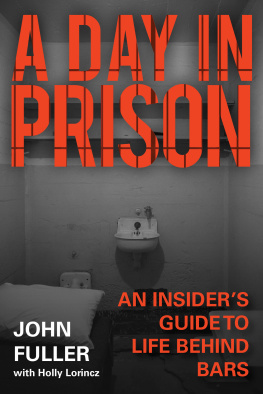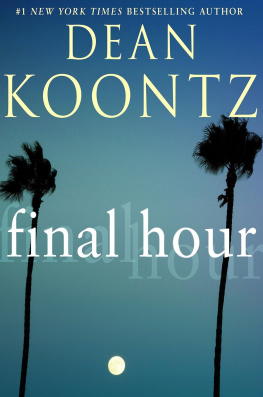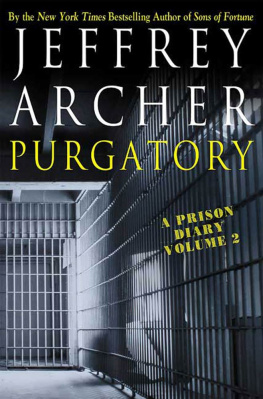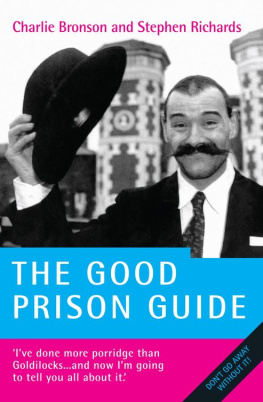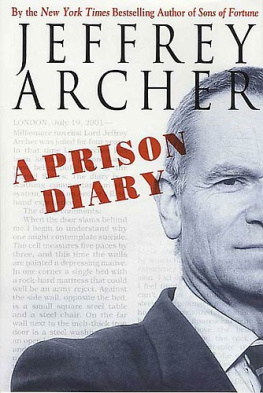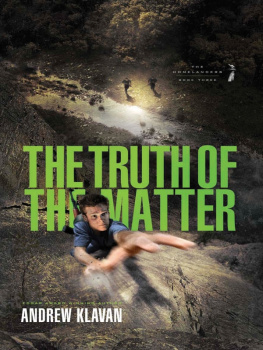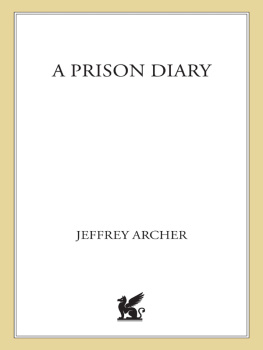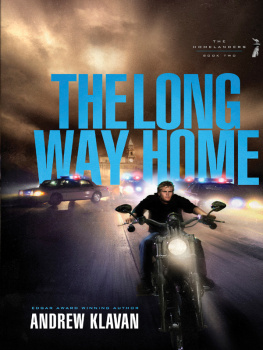THE FINAL HOUR
THE LAST HOMELANDERS NOVEL
ANDREW KLAVAN

2011 by Andrew Klavan
All rights reserved. No portion of this book may be reproduced, stored in a retrieval system, or transmitted in any form or by any meanselectronic, mechanical, photocopy, recording, scanning, or otherexcept for brief quotations in critical reviews or articles, without the prior written permission of the publisher.
Published in Nashville, Tennessee, by Thomas Nelson. Thomas Nelson is a registered trademark of Thomas Nelson, Inc.
Thomas Nelson, Inc., titles may be purchased in bulk for educational, business, fundraising, or sales promotional use. For information, please e-mail SpecialMarkets@ThomasNelson.com.
Scripture quotations are from the King James Version of the Bible (public domain).
Publishers Note: This novel is a work of fiction. Names, characters, places, and incidents are either products of the authors imagination or used fictitiously. All characters are fictional, and any similarity to people living or dead is purely coincidental.
Library of Congress Cataloging-in-Publication Data
Klavan, Andrew.
The final hour : the last Homelanders novel / Andrew Klavan.
p. cm. (The Homelanders series ; 4)
Summary: Time is short, but eighteen-year-old Charlie West has one last chance to stop the Homelanders from attacking when he finally gets back enough of his memory to realize when the terrorists are going to strike next.
ISBN 978-1-59554-715-6 (hardcover)
[1. Fugitives from justiceFiction. 2. AmnesiaFiction. 3. TerrorismFiction.
4. Adventure and adventurersFiction.] I. Title.
PZ7.K67823Fin 2011
[Fic]dc22
2011003582
Printed in the United States of America
11 12 13 14 15 16 QGF 6 5 4 3 2 1
THIS BOOK IS FOR CONOR HUDNUT.
Contents
CHAPTER ONE
Abingdon
Most people have to die to get to hell. I took a shortcut.
I was in Abingdon State Prison. Locked away for a murder I didnt commit. Waiting for the men who were coming to kill me. With nowhere to run.
It was the worst thing that had ever happened to me.
Id been there for two weeks. Two weeks of smothering boredom and strangling fear. When I was locked in my cell, the minutes seemed to lie like dead men, to decay like dead menso slowly you could barely tell it was happening. When I was out in the exercise yard or in the cafeteria or in the showers, there was just the fear, the waiting. Waiting for the killers to make good their threat, the words one of them had whispered in my ear as I stood in the dinner line one night:
Youre already dead, West. You just dont know it yet .
Alone in my cell, I stared at the tan wall. I felt a black despair surrounding me, closing in on me. I did everything I could to fight it. I did push-ups. I read my Bible. I prayed. The prayer gave me some comfort, some relief.
But then the buzzer would sound, loud and startling. The cell door would slide open. A guard would shout from the end of the tier:
Yard time!
Then the waiting and the fear would begin again.
Where was Detective Rose? I wondered desperately. I hadnt seen him since hed arrested me, since hed rescued me from the terrorist cell called the Homelanders and led me away in handcuffs. Rose was the one official who knew who I was. He knew Id been planted in the Homelanders by Waterman and his agents. He knew Id let myself be framed for the murder of my friend Alex Hauser so the Homelanders would believe I was bitter and could be recruited. Rose was one of Watermans agents tooat least, I thought he was. I told myself he must be working behind the scenes to clear my name, to win my release. I told myself he would come for me. Any day now. Any day.
But the killers came for me first.
I was in the exercise yard. It was a large square of dying grass and broken asphalt. It was surrounded by a fence topped with barbed wire. The fence was surrounded by a high concrete wall. At the corners of the wall there were guard towers. In the towers there were men with rifles, watching our every move.
Here, below, on the grass and asphalt, the prisoners moved in their gray uniforms. Some were in shirtsleeves, but most wore gray overcoats and black woolen watch caps to ward off the snow-flecked cold. Each coat or shirt had a white strip with the prisoners number on it sewn over the left breast. Each had the prisoners name stenciled over the right breast. Other than that, they were all gray.
The mens faces, on the other hand, were black and white and brown. Their eyes were hard and watchful. There was rage and meanness and fear etched into the tight lines of their cheeks and foreheads. They gathered around the benches and free weights on one corner of the asphalt or played basketball on the half-court, or played catch on the grass or just walked and talked or just sat and stared.
Guards moved among them, men in blue shirts and black pants. They carried no weapons, just heavy walkie-talkies hooked to their belts. The guards watched the prisoners, but the prisoners didnt watch the guards. The prisoners watched one another. And some of them, I knew, were watching me, waiting for their chance to attack.
I was on one of the weight benches. I was doing presses with a light bar, not trying to bulk up or anything, just trying to keep the flexibility and speed I used in my karate training. The men all around me were going for the big-muscle stuff, lifting hundreds of pounds. They worked in grim silence. Whenever I dared to steal a glance at one of them, they looked like pretty nasty pieces of work. White guys with shaved heads and thick arms and chests. They had Nazi swastikas tattooed on their biceps and on their foreheads. A couple of them had Christian crosses tattooed on them too. How they thought those two symbols could ever go togethera symbol of hatred and a symbol of loveI didnt know. Ill tell you what else: I wasnt about to ask. They didnt look like the types of guys who would enjoy a good theological conversation. They looked more like the types of guys who would enjoy punching me repeatedly in the face until I lost consciousness or died. That sounded like it would be more fun for them than for me, so I kept my mouth shut.
When I finished my workout, I moved away from them. I wandered to the edge of the crumbling basketball court, glancing this way and that to make sure no one was coming after me. I stood by the court and watched the game, feeling the cold air dry the workout sweat on my cheeks and neck.
The game was three against three. They were good players. Rough, fast, with accurate shots from anywhere near the key. They swirled back and forth in front of me in a shouting gray cloud of motion. They elbowed one another in the face, and jostled one another shoulder to chest as they fought for position under the board.
One guy broke through and went airborne, jamming a dunk through the hoop. As the teams reset, I took another nervous glance over my shoulder at the yard behind me. But this time, something made me pause.
The guards. Suddenly I didnt see any guards. The blue shirts that usually passed among the gray uniforms had vanished. I felt an instinctive clutch inside me, a flash of something like panic. Where had they all gone?
The next moment, the killers struck.
There were three of them. They were black men. In prison, the Muslims were mostly black. They werent your regular everyday Muslims either. They were hate-filled radical Islamists.
The Islamists had heard about me through the grapevine and on the news. The word was Id betrayed the Homelanders, a group of Islamo-fascists who recruited disgruntled Americans to pull off terrorist attacks on our home soil. The Abingdon prison Islamists had vowed theyd take vengeance on me. Theyd see to it that I was punished for trying to protect my country. This was their time.

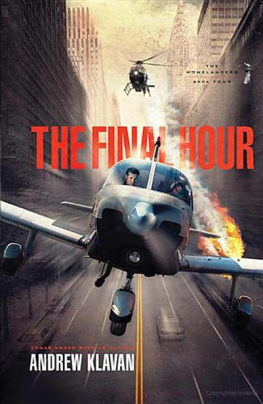
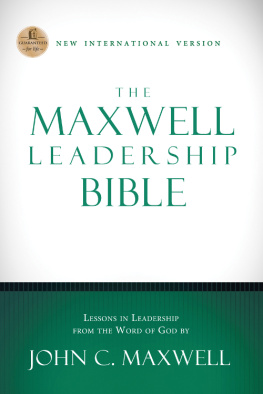

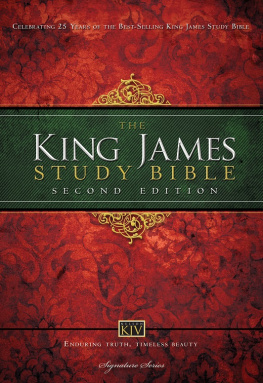
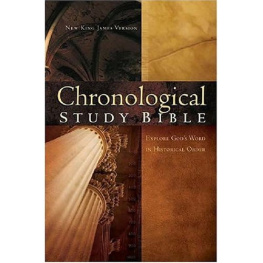
![Thomas Nelson - The NKJV Study Bible [Full-Color Edition]](/uploads/posts/book/79115/thumbs/thomas-nelson-the-nkjv-study-bible-full-color.jpg)
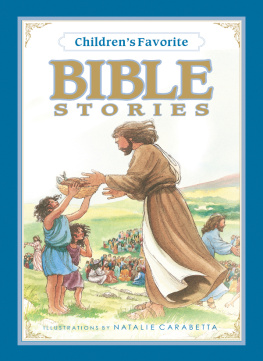

![HMP Belmarsh - A prison diary. [Volume one. Belmarsh: hell]](/uploads/posts/book/212654/thumbs/hmp-belmarsh-a-prison-diary-volume-one.jpg)
